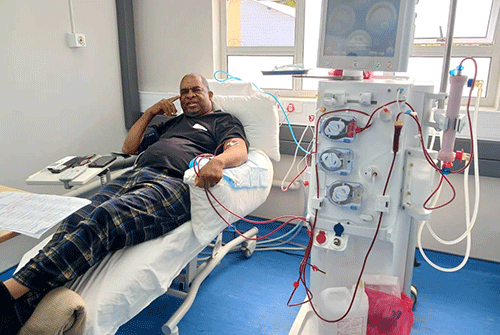Engel Nawatiseb
We, fellow patients with kidney failure conditions in Namibia who are on weekly dialysis treatment, wish to condemn the disruption of dialysis services to patients living with such conditions in Palestine and Israel, respectively.
Attacks on medical facilities and civilians are unacceptable, and a violation of international Humanitarian and Human Rights Law and Conventions.
We have noted with great disappointment that the lives of patients with kidney failure were in danger since the devastating war broke out on 7 October 2023. As a result, treatment sessions for hundreds of people, particularly children on dialysis, were reduced to once or twice a week, instead of the usual three times’ weekly sessions.
The absence of oxygen, generators and an acute shortage of the necessary supplies needed for dialysis sessions such as blood filters, cannulas and blood tubes has so far claimed the lives of scores of dialysis patients being affected by the war.
We, in Namibia, cannot stand silent while innocent children and people in need of lifesaving treatment are exposed to war as innocent victims of circumstances.
Dialysis centres, clinics and hospitals are supposed to be safe havens, but are now being transformed into scenes of death, despair and devastation. Hence, we appeal for decisive international action to secure an immediate bailout of the vulnerable situation in which patients on dialysis are confronted by the war situation.
Stop politicising the conflict by shifting the goalpost and playing the zero-sum game. Both parties causing the hostile situation should be held accountable for war crimes against humanity, particularly targeting innocent children and babies who are exposed to death due to a lack of incubators at hospitals destroyed by bombs and missiles.
In the same vein, we salute our government for promoting peaceful conditions in the country by encouraging dialogue and democratic participation by all sectors of our society in dissolving conflict situations.
We commend the Ministry of Health and Social Services, including the private sector, for providing fully-funded dialysis facilities and amenities to all needy patients all over the country.
To us, kidney failure is a condition which can be controlled as long as treatment services are not disrupted unceremoniously.
Kidney failure is not a disability, hence we can be counted among the most productive citizens of Namibia as long as employment opportunities are created by government and the private sector.
* Engel Nawatiseb (pictured) is a former deputy minister of information and communication technology, who is unemployed. He suffers from renal failure and receives dialysis on a weekly basis.



